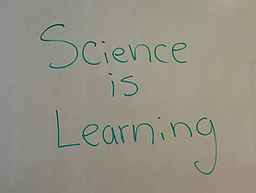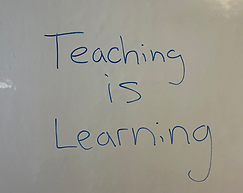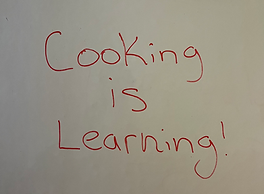Who? How? Why?
Hello! I am a trained Physicist and Machine Learning scientist, as well as a current STEM Education researcher in-training with the ultimate goal of using machine learning to understand how people learn.
So when I say, "learn", what exactly do I mean by that? This gets into one of my favorite philosophical and scientific questions: What does it mean to learn?



In computation, learning is mathematically represented and simulated with probability and statistics. In informal and formal education, learning is a cognitive process that humans experience in order to solve problems. Communication is learning. Time management is learning. Confidence is learning. Everything can be learning...
I grew up in Ocala, Florida and attended Stevens Institute of Technology as a first-generation college student in my family. I studied Physics as an undergraduate student, and quickly joined the quantum computing revolution as a Sophomore. During my PhD at the University of Oxford, I investigated the question: Do quantum computers make good generative machine learning (ML) architectures? The TLDR answer that wrapped up my dissertation: they will if we design them with intentional biases towards well-specified features in the data.
Working as an interdisciplinary researcher in both Quantum Physics and ML ultimately led to an obsession to understand how I and my research colleagues could make-sense of new ideas to solve problems. This coupled with my personal self-reflection of the informal and formal STEM education environments that I had been a part of, led to the burning desire to make positive changes in these environments. By the end of my PhD, it was clear that I needed to make a research pivot: rather than Quantum Physics to advance ML, I wanted to spend my life using ML to understand human learning and problem solving so that I can intentionally advance STEM Education.
Now, I am a post-doctoral researcher at Tufts University - working with both Prof. Micheal Hughes (ML methods) and Prof. David Hammer's (Physics Ed.) - understanding how students use sense-making as a cognitive strategy in order to solve STEM problems. My research methods are computational - specifically using state-of-the-art language models (NOT CHATGPT!) to measure sense-making in student language and dynamical time series models with Bayesian inference to measure social sense-making in student conversations. I care about working with real-time classroom data (i.e. not randomized controlled experiments) and analyzing this data quantitatively with large-scale statistical results. Conducting research in this way allows me to answer questions like the following: How does sense-making as a cognitive strategy correlate with other measurable outcomes of problem-solving? Is sense-making a generalizable cognitive strategy for solving problems of higher complexity? What about across STEM subject-domains? What do the dynamics of social sense-making look like? What role do individual decisions play in group sense-making and how do the decision dynamics influence the sense-making dynamics?
Answering these research questions are important for practical implications in the classroom. How do instructors measure whether students are sense-making and how this relates to other problem-solving outcomes (i.e. grades)? How do instructors evaluate whether their problems induce strategies that are useful across ranges of difficulty? When is it most productive for instructors to intervene and provide students with more support? How can instructors across disciplines collaborate to enhance student sense-making across subject-domains, especially as our society's STEM innovation efforts become more interdisciplinary?
Official Bio
Download CV
Dr. Kaitlin Gili is a postdoctoral researcher in the Computer Science Dept. at Tufts University that uses and advances machine learning (ML) to advance our fundamental understanding of human learning. She obtained her PhD from the University of Oxford in the field of quantum physics and machine learning with a full fellowship from the U.S. Army Research Office. Her prior publications focus on classical and quantum generative machine learning, where her current research designs ML models to investigate sense-making in STEM Education. She is a former intern of Xanadu Technologies, Zapata Computing, Los Alamos National Laboratory, and IBMQ Tokyo. She holds a Bachelors degree in Physics from Stevens Institute of Technology, where she served three years as a Young Alumni Trustee on the University Board.
In addition to research, Kaitlin pours her time into outreach projects that target K-12 students, delivering presentations in-person on latest research advancements and interdisciplinary research careers. In 2019, she co-founded the 501(c)(3) Encouraging Women Across All Borders (EWAAB), an organization who’s mission is to ensure that all young women and non-binary students have access to the mentorship and tools to succeed in their respective field. She served as the CEO of EWAAB for 2-years, and now serves as Chair of the Board, supporting the current Board and full-time CEO.
On a more personal note, she is a nomadic traveler, avid hiker, and has a huge love for mentoring, philosophy, non-fiction, and writing & performing spoken word poetry.
